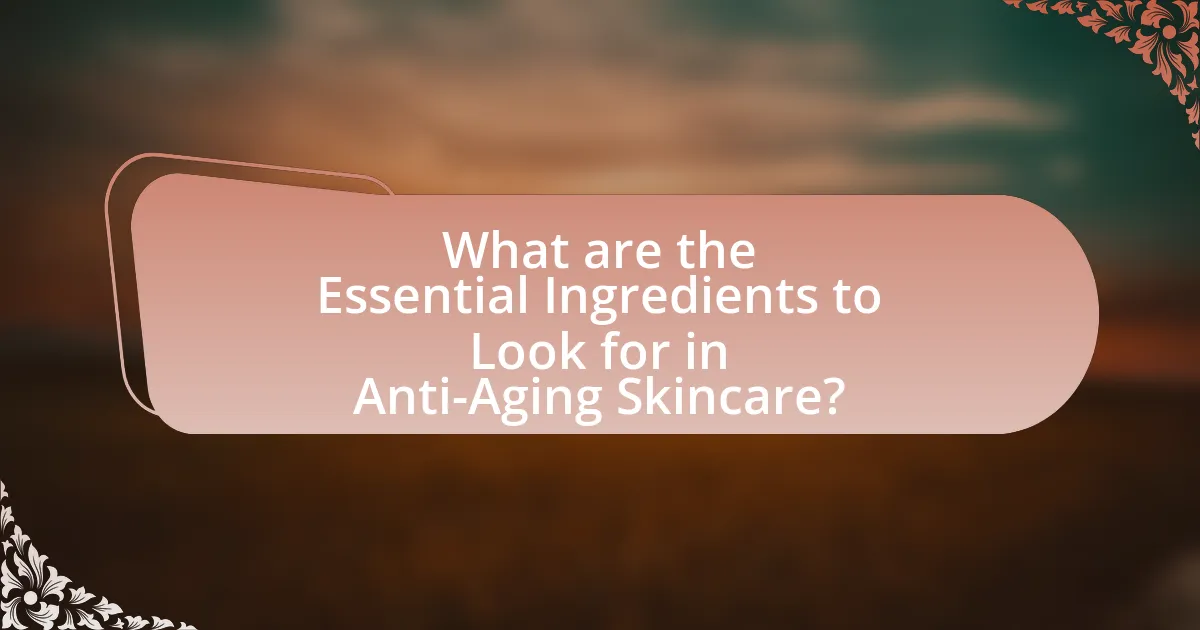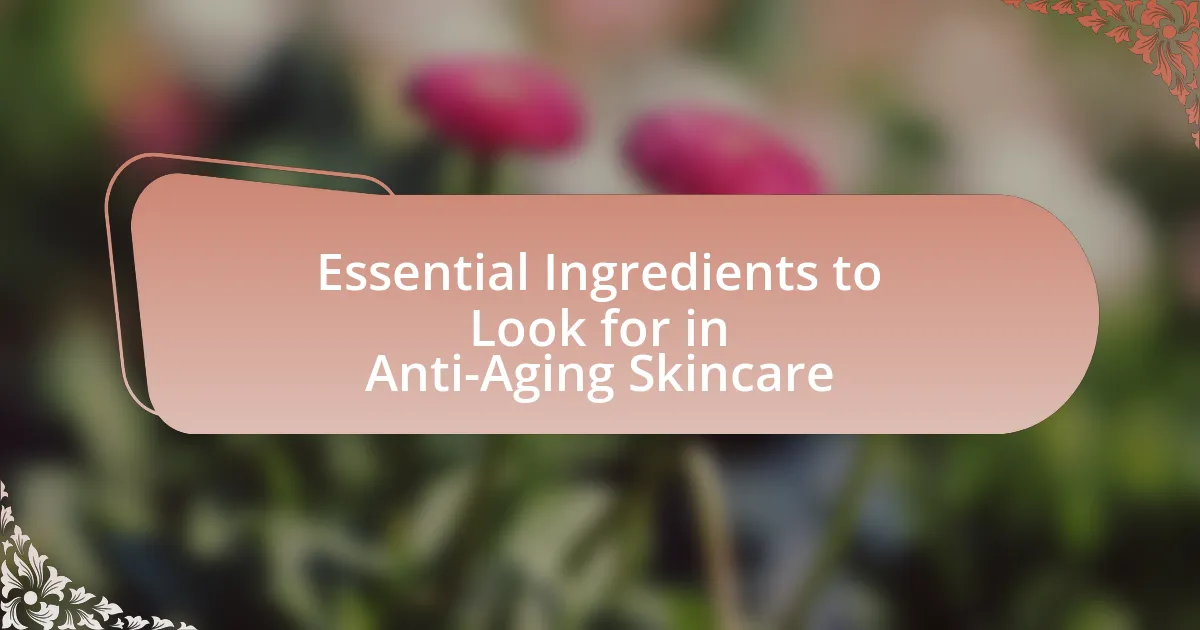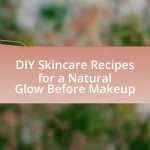The article focuses on essential ingredients to look for in anti-aging skincare, highlighting key components such as retinoids, hyaluronic acid, peptides, antioxidants, and sunscreen. It explains the importance of these ingredients in targeting biological processes that contribute to skin aging, detailing their specific roles in promoting cell turnover, hydration, and protection against oxidative stress. The article also discusses the synergy between different ingredients, the impact of skin type on ingredient selection, and common misconceptions about anti-aging products. Additionally, it addresses the latest trends and innovations in the field, emphasizing the significance of clinical studies in validating the efficacy of these formulations.

What are the Essential Ingredients to Look for in Anti-Aging Skincare?
The essential ingredients to look for in anti-aging skincare include retinoids, hyaluronic acid, peptides, antioxidants, and sunscreen. Retinoids, such as retinol, promote cell turnover and collagen production, effectively reducing fine lines and wrinkles. Hyaluronic acid provides intense hydration, plumping the skin and improving elasticity. Peptides support skin structure and repair, enhancing firmness. Antioxidants, like vitamin C, protect against free radical damage and brighten the complexion. Lastly, broad-spectrum sunscreen is crucial for preventing photoaging and protecting skin from UV damage. These ingredients are backed by dermatological research, demonstrating their efficacy in combating signs of aging.
Why are specific ingredients important in anti-aging skincare?
Specific ingredients are important in anti-aging skincare because they target the biological processes that contribute to skin aging. Ingredients like retinoids promote cell turnover and collagen production, which can reduce the appearance of fine lines and wrinkles. Hyaluronic acid provides hydration, plumping the skin and improving elasticity. Antioxidants, such as vitamin C, protect against oxidative stress, which accelerates aging. Clinical studies have shown that formulations containing these ingredients can lead to measurable improvements in skin texture and firmness, validating their significance in effective anti-aging regimens.
What role do antioxidants play in anti-aging formulations?
Antioxidants play a crucial role in anti-aging formulations by neutralizing free radicals, which are unstable molecules that can damage skin cells and accelerate aging. This protective action helps to reduce oxidative stress, a key factor in skin aging, thereby promoting a more youthful appearance. Studies have shown that antioxidants like vitamin C and E can enhance skin repair, improve elasticity, and reduce the appearance of fine lines and wrinkles, supporting their effectiveness in anti-aging products.
How do peptides contribute to skin rejuvenation?
Peptides contribute to skin rejuvenation by stimulating collagen production, which enhances skin elasticity and reduces the appearance of fine lines and wrinkles. Research indicates that specific peptides, such as palmitoyl pentapeptide-4, can penetrate the skin barrier and signal fibroblasts to produce more collagen and elastin, leading to firmer and more youthful skin. Additionally, peptides possess anti-inflammatory properties that can improve skin texture and tone, further supporting the rejuvenation process.
What are the most effective active ingredients for anti-aging?
The most effective active ingredients for anti-aging include retinoids, hyaluronic acid, peptides, antioxidants like vitamin C, and sunscreens. Retinoids, such as tretinoin, are proven to stimulate collagen production and improve skin texture, as supported by numerous dermatological studies. Hyaluronic acid is known for its ability to retain moisture, enhancing skin hydration and plumpness, which is crucial for reducing the appearance of fine lines. Peptides help in skin repair and regeneration, promoting elasticity. Antioxidants, particularly vitamin C, protect against oxidative stress and promote collagen synthesis, while broad-spectrum sunscreens prevent photoaging by blocking harmful UV rays. These ingredients are widely recognized in dermatology for their efficacy in combating signs of aging.
What benefits do retinoids provide in anti-aging products?
Retinoids provide significant benefits in anti-aging products by promoting cell turnover, reducing fine lines, and improving skin texture. These compounds, derived from vitamin A, stimulate collagen production, which enhances skin elasticity and firmness. Clinical studies have shown that retinoids can decrease the appearance of wrinkles by up to 50% after consistent use over several months, demonstrating their effectiveness in combating signs of aging. Additionally, retinoids help to fade hyperpigmentation and even out skin tone, further contributing to a more youthful appearance.
How does hyaluronic acid improve skin hydration and elasticity?
Hyaluronic acid improves skin hydration and elasticity by attracting and retaining moisture in the skin. This molecule can hold up to 1,000 times its weight in water, which significantly enhances skin hydration levels. Increased hydration leads to improved skin elasticity, as well-hydrated skin is more supple and resilient. Studies have shown that topical application of hyaluronic acid can result in a noticeable increase in skin moisture content and elasticity, making it a key ingredient in anti-aging skincare formulations.

How do these ingredients work together in anti-aging skincare?
Anti-aging skincare ingredients work together by targeting multiple signs of aging through complementary mechanisms. For instance, retinoids promote cell turnover and collagen production, while antioxidants like vitamin C neutralize free radicals, reducing oxidative stress that contributes to skin aging. Hyaluronic acid hydrates and plumps the skin, enhancing the effects of other ingredients by improving moisture retention. Together, these ingredients create a synergistic effect, leading to improved skin texture, reduced fine lines, and a more youthful appearance. Studies have shown that formulations combining these elements can significantly enhance skin elasticity and overall radiance, demonstrating their effectiveness in anti-aging regimens.
What is the synergy between different anti-aging ingredients?
The synergy between different anti-aging ingredients enhances their effectiveness in combating signs of aging. For instance, combining retinoids with antioxidants like vitamin C can improve skin texture and reduce fine lines more effectively than either ingredient alone. Research indicates that retinoids promote cell turnover, while antioxidants protect against oxidative stress, leading to a more youthful appearance. Additionally, hyaluronic acid can complement these ingredients by providing hydration, which further plumps the skin and minimizes the appearance of wrinkles. This multi-faceted approach leverages the strengths of each ingredient, resulting in a comprehensive anti-aging effect.
How can combining antioxidants and peptides enhance results?
Combining antioxidants and peptides enhances results by synergistically improving skin health and appearance. Antioxidants protect skin cells from oxidative stress and free radical damage, while peptides stimulate collagen production and improve skin elasticity. Research indicates that antioxidants like vitamin C can enhance the efficacy of peptides, leading to improved skin texture and reduced signs of aging. For instance, a study published in the Journal of Cosmetic Dermatology found that a formulation combining vitamin C and peptides resulted in a significant reduction in fine lines and wrinkles compared to using either ingredient alone. This synergy maximizes the anti-aging benefits, making the combination particularly effective in skincare formulations.
What is the impact of layering products with various active ingredients?
Layering products with various active ingredients can enhance the effectiveness of a skincare routine by allowing for targeted treatment of multiple skin concerns simultaneously. This practice can lead to improved skin texture, increased hydration, and better overall skin health, as different ingredients can work synergistically to address issues such as fine lines, pigmentation, and dryness. For instance, combining hyaluronic acid for hydration with retinol for anti-aging can yield more pronounced results than using either ingredient alone, as supported by studies indicating that retinol enhances skin cell turnover while hyaluronic acid maintains moisture levels.
What should consumers consider when choosing anti-aging products?
Consumers should consider the active ingredients in anti-aging products, as these determine the effectiveness of the product. Key ingredients to look for include retinoids, which promote cell turnover and collagen production, hyaluronic acid for hydration, and antioxidants like vitamin C that protect against free radical damage. Research indicates that retinoids can reduce the appearance of fine lines and wrinkles by up to 50% over several months, demonstrating their efficacy. Additionally, consumers should evaluate their skin type and specific concerns, as different formulations may be more suitable for oily, dry, or sensitive skin.
How can skin type influence the choice of anti-aging ingredients?
Skin type significantly influences the choice of anti-aging ingredients because different skin types have unique needs and responses to various compounds. For instance, individuals with dry skin may benefit from hydrating ingredients like hyaluronic acid and glycerin, which help retain moisture and improve skin elasticity. Conversely, oily skin types may require lightweight formulations with ingredients such as salicylic acid or retinol, which can help control excess oil and prevent breakouts while promoting cell turnover. Additionally, sensitive skin types often respond better to soothing ingredients like chamomile or aloe vera, as harsher anti-aging agents can cause irritation. This tailored approach ensures that the selected anti-aging ingredients effectively address the specific concerns associated with each skin type, leading to better overall results.
What are the common misconceptions about anti-aging skincare ingredients?
Common misconceptions about anti-aging skincare ingredients include the belief that all natural ingredients are effective and that higher concentrations of active ingredients always yield better results. Many consumers assume that because an ingredient is derived from nature, it is inherently safe and effective, which is not always the case; for example, some natural extracts can cause irritation or allergic reactions. Additionally, while higher concentrations of ingredients like retinol or vitamin C can be beneficial, they can also lead to increased sensitivity and adverse effects if not used correctly. Research indicates that the effectiveness of anti-aging ingredients often depends on their formulation and delivery method rather than just their concentration, highlighting the importance of product formulation over ingredient quantity.

What are the latest trends in anti-aging skincare ingredients?
The latest trends in anti-aging skincare ingredients include the use of peptides, retinoids, antioxidants, and growth factors. Peptides are favored for their ability to stimulate collagen production, while retinoids are recognized for their effectiveness in reducing fine lines and improving skin texture. Antioxidants, such as vitamin C and niacinamide, help combat oxidative stress and enhance skin radiance. Growth factors are gaining popularity for their role in cellular regeneration and skin repair. These ingredients are supported by research indicating their efficacy in promoting youthful skin appearance and improving overall skin health.
How are natural ingredients being integrated into anti-aging formulations?
Natural ingredients are being integrated into anti-aging formulations through the incorporation of botanicals, peptides, and antioxidants that promote skin health and rejuvenation. For instance, ingredients like hyaluronic acid, derived from natural sources, provide hydration and plumpness, while plant extracts such as green tea and resveratrol offer potent antioxidant properties that combat oxidative stress, a key factor in aging. Research has shown that these natural components can enhance skin elasticity and reduce the appearance of fine lines, making them effective in anti-aging products. Additionally, formulations increasingly utilize oils like argan and rosehip, which are rich in essential fatty acids and vitamins, further supporting skin repair and regeneration.
What are the benefits of using plant-based extracts in skincare?
Plant-based extracts in skincare offer numerous benefits, including enhanced hydration, antioxidant protection, and anti-inflammatory properties. These extracts, derived from various plants, contain vitamins, minerals, and phytochemicals that nourish the skin. For instance, aloe vera is known for its soothing and hydrating effects, while green tea extract provides powerful antioxidants that combat free radicals, reducing signs of aging. Additionally, botanical ingredients like chamomile and calendula have anti-inflammatory properties that help calm irritated skin. Research has shown that products containing plant-based extracts can improve skin texture and elasticity, making them essential components in anti-aging skincare formulations.
How do probiotics contribute to skin health and aging?
Probiotics contribute to skin health and aging by enhancing the skin’s microbiome, which helps maintain its barrier function and reduces inflammation. Research indicates that a balanced skin microbiome can improve hydration, reduce the appearance of fine lines, and promote overall skin resilience. A study published in the Journal of Investigative Dermatology found that probiotics can modulate the immune response in the skin, leading to decreased signs of aging and improved skin texture. Additionally, probiotics may help in the management of conditions like acne and eczema, further supporting skin health as it ages.
What innovations are shaping the future of anti-aging skincare?
Innovations shaping the future of anti-aging skincare include the development of advanced peptides, stem cell technology, and personalized skincare formulations. Advanced peptides, such as Matrixyl and Argireline, are designed to stimulate collagen production and reduce the appearance of fine lines, with studies showing a significant improvement in skin elasticity and texture. Stem cell technology harnesses the regenerative properties of plant stem cells to promote skin repair and rejuvenation, evidenced by research indicating enhanced skin barrier function and hydration. Additionally, personalized skincare formulations utilize AI and genetic testing to tailor products to individual skin types and concerns, leading to more effective anti-aging solutions. These innovations are transforming the landscape of skincare by providing targeted, scientifically-backed approaches to combat aging.
How is technology influencing the development of new anti-aging ingredients?
Technology is significantly influencing the development of new anti-aging ingredients by enabling advanced research methods and formulation techniques. For instance, innovations in biotechnology allow for the extraction and synthesis of active compounds from natural sources, enhancing their efficacy and stability. Additionally, data analytics and artificial intelligence are being utilized to identify potential anti-aging ingredients through large-scale screening of chemical compounds, leading to the discovery of novel molecules that can target specific aging processes. Furthermore, advancements in delivery systems, such as nanotechnology, improve the penetration and absorption of these ingredients into the skin, maximizing their benefits. These technological advancements are supported by studies demonstrating improved outcomes in skin health and appearance when utilizing these newly developed ingredients.
What role do clinical studies play in validating new anti-aging products?
Clinical studies play a crucial role in validating new anti-aging products by providing scientific evidence of their efficacy and safety. These studies involve rigorous testing on human subjects to assess the product’s ability to deliver promised results, such as reducing wrinkles or improving skin elasticity. For instance, a clinical trial published in the Journal of Cosmetic Dermatology demonstrated that a specific anti-aging cream significantly improved skin texture and hydration after 12 weeks of use, confirming its effectiveness. Such evidence from clinical studies is essential for consumers and regulatory bodies to trust the claims made by manufacturers regarding anti-aging products.
What practical tips can help consumers select effective anti-aging skincare?
To select effective anti-aging skincare, consumers should prioritize products containing proven ingredients such as retinoids, hyaluronic acid, and antioxidants. Retinoids, derived from vitamin A, have been clinically shown to reduce fine lines and improve skin texture by promoting cell turnover. Hyaluronic acid is a powerful humectant that retains moisture, helping to plump the skin and reduce the appearance of wrinkles. Antioxidants like vitamin C and E protect the skin from oxidative stress and can enhance skin brightness and firmness. Research indicates that these ingredients are supported by scientific studies for their efficacy in combating signs of aging, making them essential for consumers seeking effective anti-aging solutions.


